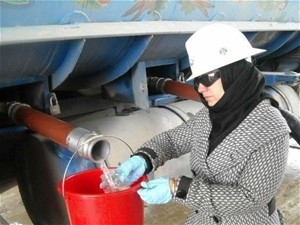
Wahida, a technician at the power plant, says, “Being a woman in construction – this is a first time experience.”
USAID/AIRP
USAID helps young women gain skills to improve infrastructure in Afghanistan.
9 FEBRUARY 2010 | KABUL, AFGHANISTAN
Stereotypes are fading fast in Afghanistan, where many women are occupying non-traditional positions that were long held by men. At the USAID-funded Tarakhil Power Plant near Kabul, women are proving that they are every bit as qualified as men to contribute to the development of their country.
Twice a day, Senior Fuel Attendant Wahida puts on her boots, safety glasses, and hard hat to oversee the safe discharge of diesel fuel into underground tanks at the power plant. In her first job at Tarakhil, when the plant was being built, Wahida was the inspector who tested the high-wire scaffoldings to ensure that the platforms could bear the weight of workers. She used that information to recommend when harnesses or safety cables were required, keeping workers safe and construction on track.
“Being a woman in construction – this is a first-time experience,” Wahida said. “There was teasing, but I didn’t pay attention to it.”
The same is true for Monisa, assistant to the director of information technology at USAID’s Afghanistan Infrastructure and Rehabilitation Program (AIRP). After years of on-the-job training, she is proficient in many areas of information technology, from computer applications to hardware. When her job requires, she scrambles under office desks to hook up computers and printers or climbs on ladders to check on wireless routers.
“Women say that this is a man’s job,” Monisa said. “[They say] that it’s too hard for women to do. But I know computers, and this is what I like.”
These non-traditional opportunities have fostered growth and professionalism in the lives of these young women. Both, in turn, have made significant contributions to the success of U.S. Government-funded development programs that are rebuilding their country and helping to create a successful future for other young women in Afghanistan.







Comment
Make a general inquiry or suggest an improvement.